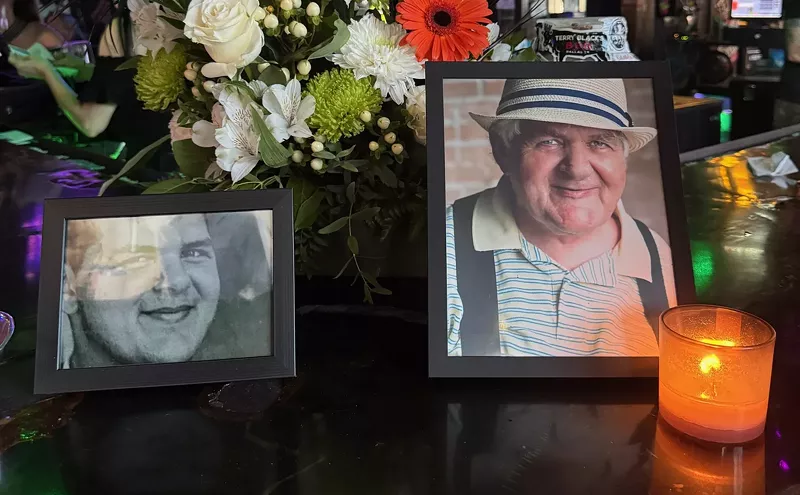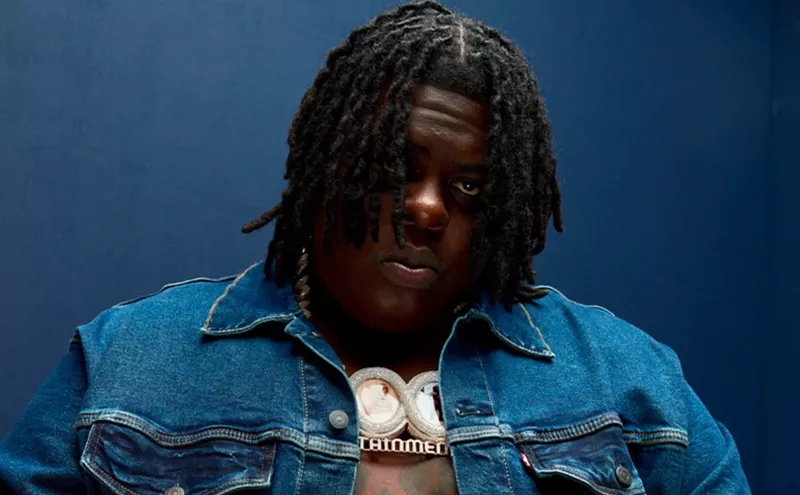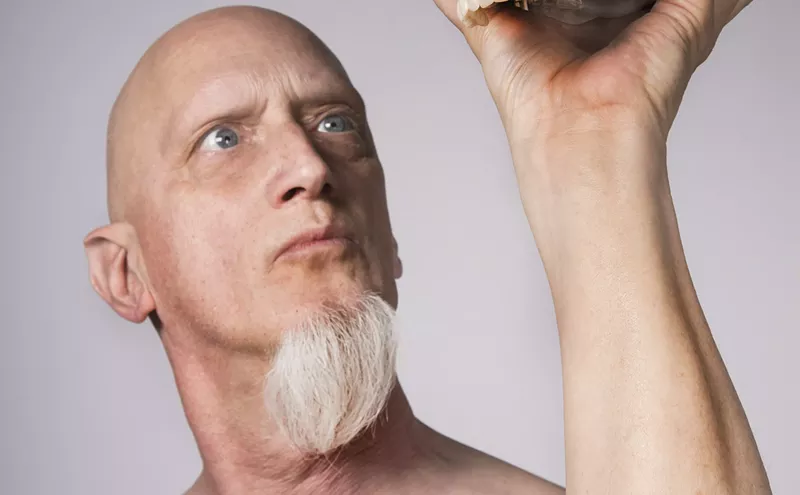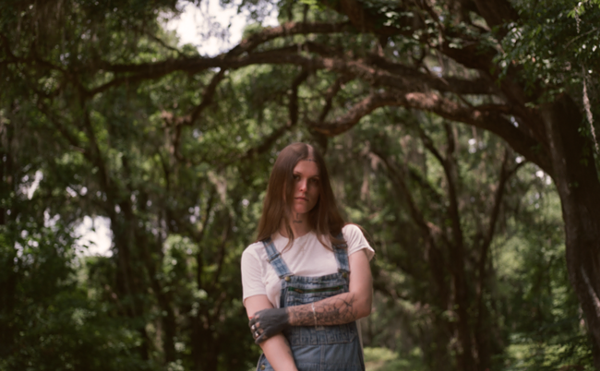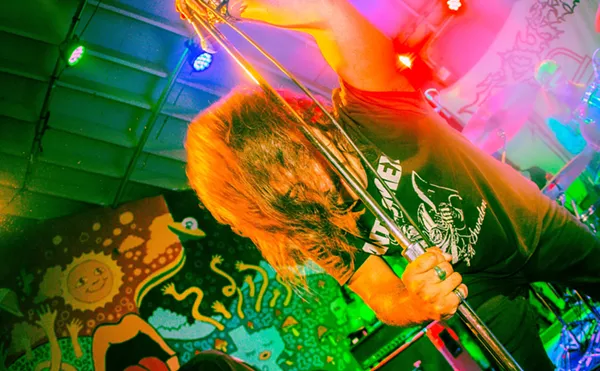There was something endearingly perverse about Buckley filling out a zoo application form. Most musicians dream of the day when they can quit their day jobs, when they can pay the rent simply by playing music. But Buckley, who'd long since reached that point, actually sought out the chance to be an anonymous working grunt.
"Jeff really wanted to integrate himself into the fabric of whatever the city meant to him," says David Shouse, a friend of Buckley's and founder of the legendary Memphis band the Grifters. "I think he felt that he'd escaped from 'the man' in New York and he didn't have to hide any further down here. Just being here was enough."
Buckley never found out whether he got hired at the zoo. On May 29, 1997, he drowned in the Mississippi River, seemingly a casualty of a careless accident. But his wide-eyed zeal for the kind of average-Joe existence that many of us would prefer to escape says a lot about what drove this eccentric, extravagantly talented artist. It's reminiscent of the way comedian Andy Kaufman moonlighted as a busboy while starring on a hit TV sitcom. To push the comparison further, even after releasing his first album, Buckley often stopped by Sin-e, the New York club where he first created a buzz, and volunteered to wash dishes.
Like Kaufman, Buckley was an oddball--albeit a much sexier oddball--whose chronic sense that he was an outsider only made him more eager to be ordinary. But as the new Buckley live CD collection Mystery White Boy confirms, nothing about Buckley was ordinary.
He had a voice of mind-boggling range and emotional power, and he could switch from soaring exultation to throat-scraping fury at the crack of a snare drum. His musical influences were so broad that it was always tough to pin him down stylistically, but that's what made him so intriguing. Buckley loved Adam and the Ants as much as he did Nusrat Fateh Ali Khan; he was drawn to Judy Garland in the same way he was drawn to Led Zeppelin.
Even in 1994, it seemed fitting that Buckley emerged with Grace shortly after Kurt Cobain blew himself away. In a way, Buckley's search for musical transcendence was an antidote to Cobain's hopelessness.
The two doomed idols were flip sides of the same generational coin, born only five months apart. Like Cobain, Buckley was raised by his mom and never formed a solid bond with his father (in Buckley's case, he met his father, jazz-folk troubadour Tim Buckley, only once). Like Cobain, he seemed unusually preoccupied with death, swiftly announcing on Grace's title song: "Well it's my time coming, I'm not afraid to die." Little wonder, then, that the widow Cobain, Courtney Love, very publicly courted Buckley in 1995.
But Buckley's work argues that, unlike Cobain, he didn't see death as merely a fast answer to ennui and misery. For Buckley, like the Eastern mystics he admired, death was part of life, a phase that should be greeted with acceptance.
Though he possessed some of the same demons that nagged at Cobain, he consciously chose to embrace his more life-affirming qualities. As he told a reporter in 1994, "The most audacious thing I could possibly state in this day and age is that life is worth living."
Buckley's peculiar sense of tortured exhilaration is at the core of Mystery White Boy. On the frenzied "Mojo Pin," Buckley cuts loose with a wild falsetto that mutates into a Robert Plant scream straight out of Led Zeppelin II. He also ups the ante on one of Grace's highlights, "Eternal Life," transforming it into a churning speed-metal epic that nails hate mongers and hypocrites of all stripes.
Because Buckley was such a natural and spontaneous performer, Mystery White Boy never falls into the trap of most live albums, which tend to be distracted regurgitations of studio recordings. Buckley uses his studio versions as mere blueprints for a full-frontal live assault, turning "Dream Brother," a five-minute track on Grace, into eight and a half minutes of unrelenting, droning tension. Buckley's goofy sense of humor also manifests itself here, with a brief, campy imitation of Edith Piaf in front of an adoring Paris audience.
As stirring as Mystery White Boy is, though, it falls short on two counts. For one thing, the album is composed of two-track, soundboard recordings that don't fully capture the richness of Buckley's band. But Buckley simply didn't live long enough to make a proper live record--aside from his solo 1993 EP Live at Sin-e--and this album's sonic shortcomings are a small price to pay when it means the chance to hear more music from an artist whose career ended far too soon.
The album's other flaw can probably be pinned at the door of Columbia Records. Michael Tighe, Buckley's guitarist and a co-producer of the disc, had originally planned on compiling an album that focused on obscure, unreleased tracks. But according to Shouse (who has worked with Tighe in the band Those Bastard Souls), Columbia urged Tighe to incorporate several of the most popular songs from Grace.
As a result, only three previously unreleased originals and two covers made the final cut on Mystery White Boy. In a way, it's hard to fault the inclusion of Buckley standards like "Last Goodbye" or "Mojo Pin," but there's little doubt that a set of rarities would have been a fresher, more rewarding farewell for Buckley loyalists.
Buckley's choice of outside material offered fascinating clues into his bewildering musical wanderlust. On a given night, he was likely to cover everything from the MC5's "Kick Out the Jams" to Sly Stone's "Everyday People" to Bob Dylan's "If You See Her Say Hello" to Van Morrison's "The Way Young Lovers Do" (although not available on Mystery White Boy, "Kick Out the Jams" is included on the new video release Jeff Buckley: Live in Chicago).
On Mystery White Boy, Buckley delivers a definitive version of Alex Chilton's jagged masterpiece "Kanga Roo," almost convincing you that the song was written for him to sing. His impromptu take on the Judy Garland showstopper "The Man That Got Away" is strange, but oddly affecting. It offers a reminder that part of what made Buckley interesting was the way his elastic voice could take on a feminine quality, the way he could evoke sexual ambiguity without being coy.
Among the three previously unreleased originals, the standout is "I Woke Up in a Strange Place," a blistering rocker that ranks alongside Buckley's most dynamic tunes.
It could have fit snugly on My Sweetheart the Drunk, the album that Buckley was laboring over when he died (a collection of those songs, along with a number of other unreleased recordings, were put out posthumously in 1998 as a double-disc set called Sketches (For My Sweetheart the Drunk)). That album marked the point when Buckley's long-standing resistance to record-company interference came to a head. Buckley believed that the suits at Columbia were pressuring him to be the kind of big-time rock star that he didn't feel comfortable becoming. Meanwhile, after recording an album's worth of tracks with ex-Television leader Tom Verlaine, he decided to start from scratch.
"He told me that he heard too much New York in the record he had made, and he wanted to try to get a looser, more laid-back feel that he was picking up in Memphis," recalls Robert Gordon, a music writer who befriended Buckley in the final months of his life.
"He wasn't really happy with the slickness of Grace," Shouse adds. "At the very least, he knew he didn't want to do it again. He talked about making a rougher record. And we told him that this was a place you could get away with whatever you wanted to get away with."
Watching Buckley at his final Monday-night gigs at Barrister's, one sensed that he was trying to re-create the vibe he'd felt in his early days at Sin-e, before he had expectations to live up to. At Barrister's, accompanied only by his electric guitar, he'd test new material and improvise lyrics on the spot. Sometimes he'd tell rambling stories about his childhood. When he wasn't onstage, he'd spend hours playing pool until closing time.
Contrary to rumors at the time, which suggested that Buckley was grappling with creative burnout, he seemed--as usual--to be facing the opposite problem: how to make sense of his overload of ideas.
"In a way, he was always on, whether he was onstage or just hanging out, and that's why I think the stage suited him so well," Gordon says. "He had this undercurrent of energy, which I don't think he could really control. He could wrangle it sometimes, and that was when he made great music or when he was particularly funny. But he would just as easily riff on a long and funny, but not very cogent, tale.
"He was really nice and pretty gentle. For someone who had done so much, there was an innocence--I don't know if it was an innocence or a purity. It was like his voice. It was a natural thing, like a mountain is a natural thing. He was in a nasty business, but the slime didn't stick to him."
In the three years since his death, Buckley's stature has slowly grown. Artists like Marianne Faithfull, Bono, Chris Cornell, and Patti Smith have waxed rhapsodic about his talent. Aimee Mann and Juliana Hatfield have written songs about him. They all recognize that Buckley, while capable of self-indulgence and lapses in judgment, simply reached heights that most pop musicians never even dream about.
In his liner notes to Nusrat Fateh Ali Khan's 1996 album The Supreme Collection Volume 1, Buckley wrote of Khan: "Part Buddha, part demon, part mad angel, his voice is velvet fire, simply incomparable." Buckley just as easily could have been writing about himself.



